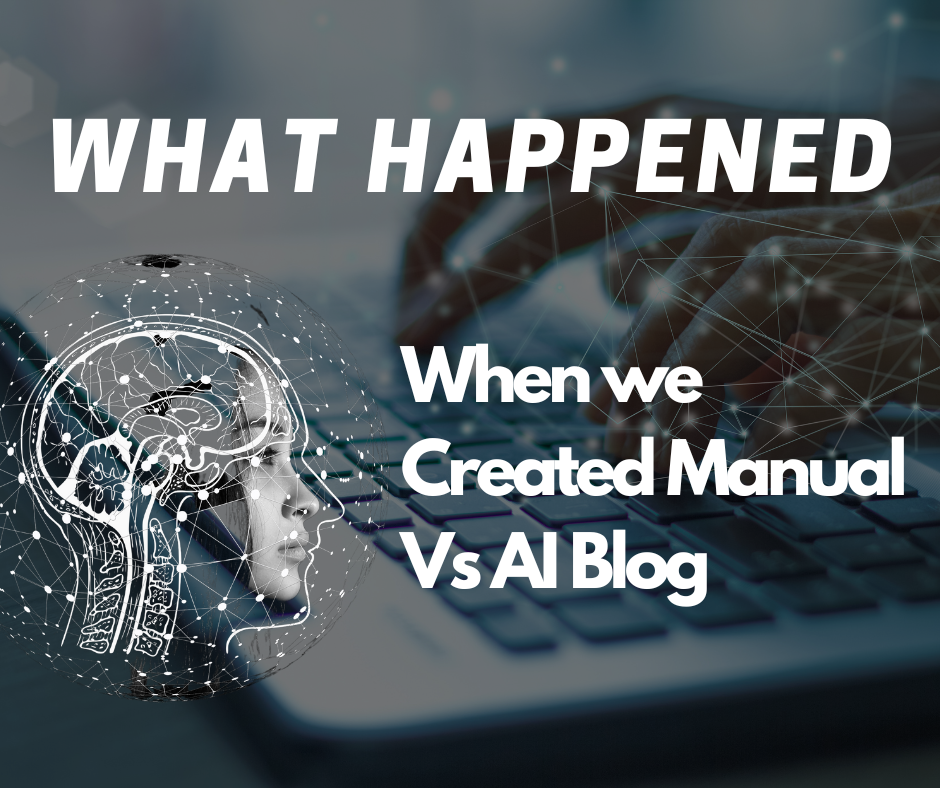Experiment 1: AI-based Blog writing vs. Manual Blog writing
Objective:
To compare the efficiency and effectiveness of writing content manually versus utilizing AI tools in terms of time spent and quality of the content produced.
I hired a 5-star rated Blogger to write a content manually for the process.
Methodology:
- Manual Content Writing: The blogger wrote a blog post of 1000 words on a specific topic without using any AI tools. The blogger followed their usual process, including research, outlining, and writing.
- AI-assisted Content Writing: For the second experiment, the blogger utilized an AI-powered content generation tool to assist in writing a blog post of similar length and topic. The blogger provided initial input, such as a brief outline or keywords, and the AI tool generated the content based on that input.
- Evaluation: The blogger assessed both pieces of content in terms of quality, coherence, and relevancy to the topic. Additionally, the time spent on each approach was recorded.
Results:
-
Manual Content Writing:
- Time spent: 4 hours
- Quality: The content was well-written, with a personal touch and in-depth research. However, the process was time-consuming, requiring significant effort and attention to detail.
-
AI-assisted Content Writing:
- Time spent: 1 hour
- Quality: The AI-generated content was coherent and covered the main points of the topic. However, there were instances where the content lacked a personal touch and required minor editing to align with the blogger’s writing style.
Conclusion:
The experiment demonstrated that AI-assisted content writing significantly reduced the time required to produce content compared to manual writing. While the AI-generated content was generally good, it lacked the unique voice and personal touch that the blogger’s manual writing provided. The blogger found that a combination of AI assistance and human editing yielded the best results, saving time without compromising on quality.
Experiment 2: AI-based Keyword Research vs. Manual Keyword Research
Objective:
To compare the effectiveness of AI-powered keyword research tools versus manual keyword research in terms of identifying relevant and high-performing keywords.
Methodology:
- Manual Keyword Research: The blogger conducted manual keyword research using various techniques such as brainstorming, competitor analysis, and utilizing keyword research tools without AI assistance. The blogger identified a list of keywords relevant to the blog’s topic.
- AI-based Keyword Research: Using an AI-driven keyword research tool, the blogger inputted the same topic and received a list of recommended keywords. The tool leveraged machine learning algorithms and data analysis to suggest potentially high-performing keywords.
- Evaluation: The blogger analyzed the keywords from both approaches based on relevance, search volume, competition, and potential to drive organic traffic. The blogger also measured the time taken for each research method.
Results:
-
Manual Keyword Research:
- Time spent: 3 hours
- Keyword Selection: The blogger identified relevant keywords, but the process was time-consuming and involved extensive manual analysis of competition and search volume. Some potentially valuable keywords may have been missed due to limitations in manual research capacity.
-
AI-based Keyword Research:
- Time spent: 1 hour
- Keyword Selection: The AI tool provided a comprehensive list of relevant keywords, including long-tail and low-competition keywords. The tool’s data-driven insights helped identify potentially valuable keyword opportunities that the blogger may have overlooked during manual research.
Conclusion:
The experiment revealed that AI-based keyword research significantly reduced the time required to identify relevant and potentially valuable keywords compared to manual research. The AI tool’s data-driven insights provided the blogger with a more comprehensive keyword list, including valuable long-tail and low-competition keywords. However, manual keyword research allowed the blogger to apply human judgment and contextual knowledge, ensuring the final keyword selection aligned with their content strategy.
Combining the power of AI-driven keyword research tools with human expertise and editing provides the best results


